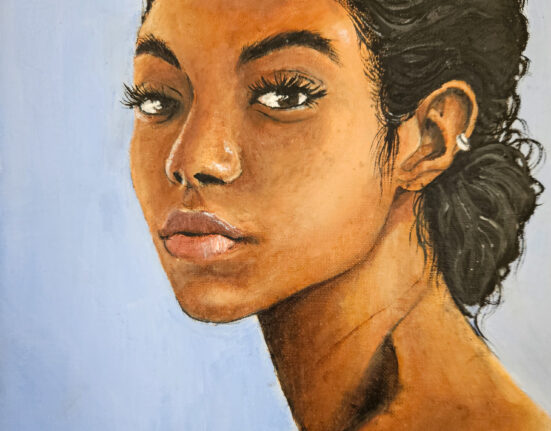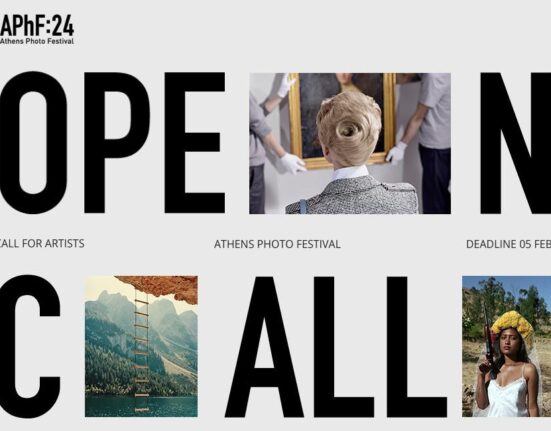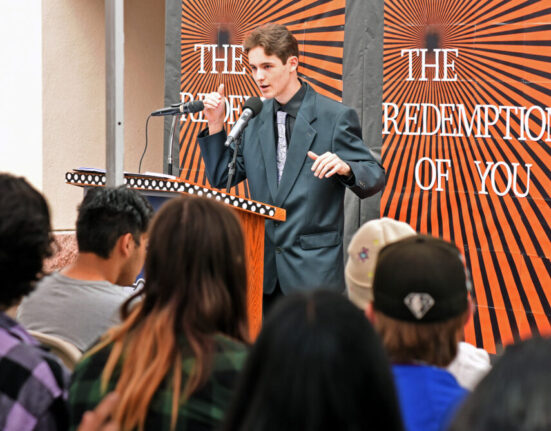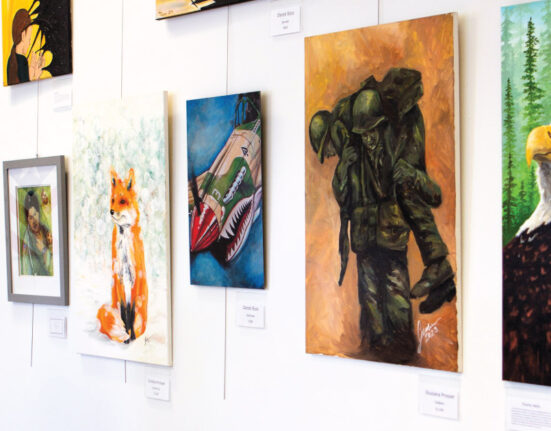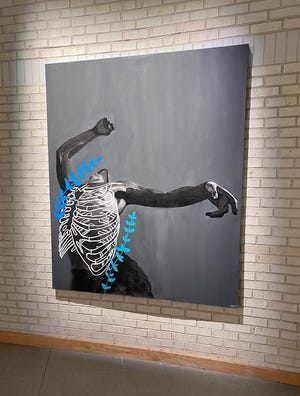What are contemporary visual artists up to in this part of Florida?
Every three years, the Skyway collaboration answers that question with a regional exhibition. It’s one show, but not in one place. “Skyway 2024” unfolds on a staggered schedule through January 2025 in five regional art museums – The Ringling and Sarasota Art Museum in Sarasota; the Museum of Fine Arts in St. Petersburg; USF Contemporary Art Museum, in Tampa; and Tampa Museum of Art, in Tampa.
New work by 63 local artists is showcased in all five venues. They’re all based in the greater Tampa Bay region. But they share no Tampa Bay style, message or method. These creators work locally, but think globally. Their creations are inspired by art and cultural movements around the planet. For many expatriate artists, the inspiration flows from their lands of birth. “Skyway 2024” reveals these local/global connections. It begins at The Ringling this year. We will, too.
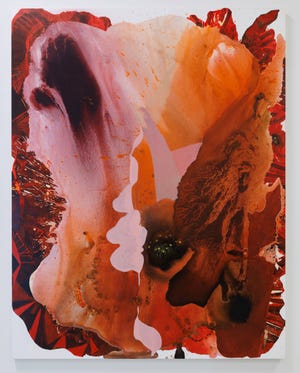
Ola Wlusek and Christopher Jones curated The Ringling iteration of “Skyway 2024,” selecting nearly 100 art pieces by 13 area-based creators and co-creators. There’s a lot to see, so I’ll stick with four that caught my eye.
Carol Mickett and Robert Stackhouse, who now live and work in St Petersburg, have created art together since they met in 2001. She has a background in philosophy; he’s always been a working artist; but they’re of one mind. “Water is life” is the shared creed animating many of their co-creations.
Need a break? Play the USA TODAY Daily Crossword Puzzle.
Simply put: Rivers, lakes and streams keep us all alive. These tributaries are nature’s fragile circulatory system. But humanity is fouling the waters. The couple’s collaborative art reveals our downstream impact. “State of Water” (2015-2024) looks at Florida’s floating worlds.
The 10 x 12” triptych depicts the Sunshine State’s waterways. It’s more than a map – it’s a precise diagnosis of the waters’ failing health. How do you measure that? As this couple discovered, the health of whales and waters have a direct correlation. When whale populations decrease; it’s a sign that the waters where they live have gone bad. (And it’s usually our fault.) Whale deaths are nature’s way of telling us something’s wrong. The couple’s triptych just passes that message along.
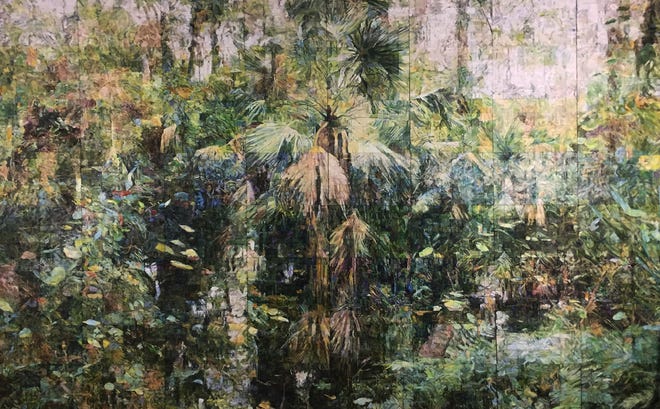
Jake Fernandez also feels nature’s pain. This Cuban expatriate is alive and well and working in Bradenton. He’s a unique breed of conceptual artist known for large-scale pieces. His focus is Florida’s fragile web of life. His method is a synthesis of painting and photography. But it’s not Photorealism. Take Fernandez’ “Myakka Fork 2” (2024). It’s a languid, riverside scene at Myakka State Park.
This multimedia painting began as a reference photo. But it’s far from realistic. It’s a shattered image, broken into grids that don’t line up, like a mosaic that didn’t set right. So what’s the concept behind it? As I read it, Fernandez takes a page from Alan Watts. Humanity can’t see nature as a whole. To see it at all, we break it up into Cartesian grids. But we’re still missing a lot. Fernandez’ fractured image hints of our collective blind spot.
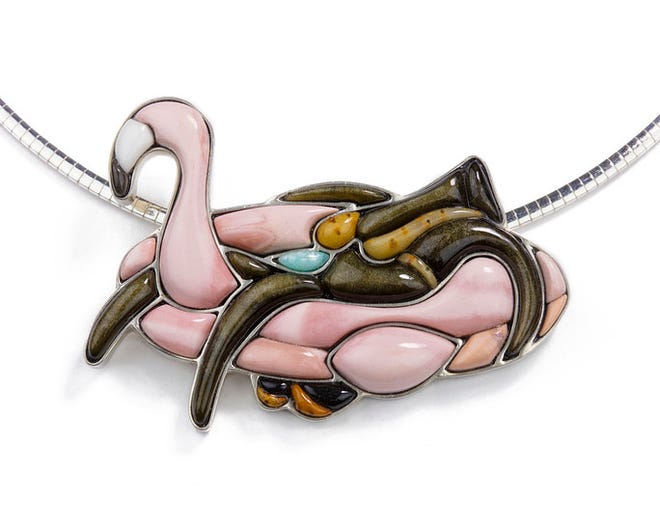
Caitlin Albritton is a slyly, satirical oil painter. This Tampa-based artist has a knack for witty paintings capturing America’s awkward, self-conscious bodies at the gym and beach. She also turns shining stones into wearable art (aka “jewelry”). Albritton’s latest bejeweled series celebrates the female form in every form. “Flamingo Float” (2021) is one such celebration.
This intricate, inlaid piece depicts a pink flamingo pool float – and the stylized female figure sitting within. She’s curvaceous, not skinny, and utterly relaxed. Albritton created this lighter-than-air dazzler with tiny, heavy stones. Lots of them, including obsidian, pink opal, petrified palm root, amazonite, howlite, and jasper. It’s a visual confection. She tops it off with sterling silver and inlaid gold.
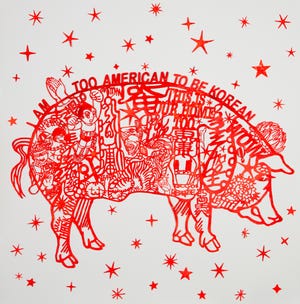
Joo Woo is an associate professor at USF. She teaches painting and drawing. That’s also what she does. She’s now based in Tampa. But Woo was born and raised in South Korea. You can see that heritage in her art. Woo’s latest series collects the colors and images of her Korean childhood like tiny toys in a cigar box. Woo’s “Lucky Pig” (2024) is part of her loving series. This particular porker is packed with intricate Korean icons (created from cut paper) and painted a firehouse red. It’s a puzzle box of Korean signs, symbols and references, both political and persona. For Woo, the pig motif is personal. After she left home to study in America, her father mailed her pig-themed stencils as symbols of good luck and prosperity. How personal can you get? But Woo’s porcine image also has a political side. Red (a commie color) was once banned in Korean textbooks. “Lucky Pig” takes that color back – and makes it her own. Some pig!
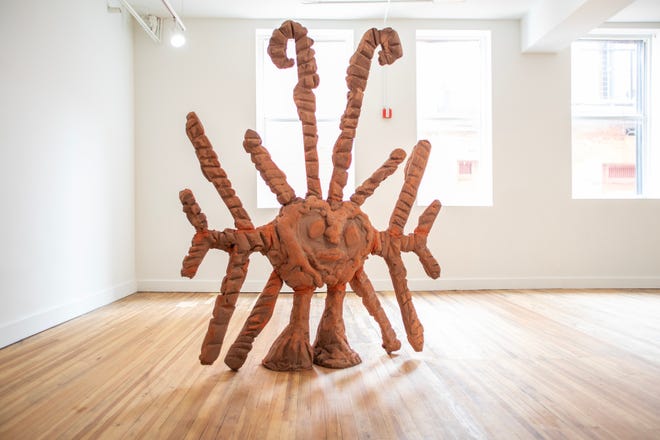
Libby Ponce is a native of Ecuador. She creates sculptures, full-circle videos, installations, and performance art. She’s now based in Tampa, but she left her heart in Ecuador. Ponce calls herself a “Latinx-Futurist. I think she got it right. Ponce’s art looks forward to a decolonized future. To create it, she looks back to Ecuador’s pre-colonial past, before European colonists ever set foot on her homeland. This backwards glance isn’t a nostalgic daydream. For Ponce, it’s a specific, anthropological practice.
She starts with scientific research on physical artifacts. To create her latest sculptural series, Ponce scanned a trove of ancient Andean ceramics. That task sounds as dry as dust. But those anthropomorphic figures were erotic as hell. Ponce’s “star_butterfly_owl_heart_bird” (2023) reflects its naughty mythic ancestry. It’s a massive, sculptural rendering of one of those ancient figures. Ponce’s eldritch entity greets you with a heart-shaped face and tentacle-like antennae. Welcoming or terrifying? That depends on how you look at it.
Looking ahead, here’s a look at all five “Skyway” exhibitions. They begin close to home at The Ringling. They’ll continue at museums across our region for the rest of the year.
Skyway 2024: A Contemporary Collaboration
The exhibition runs in five regional art museums on different schedules into January 2025. The Ringling: May 25 – Jan. 26. 5401 Bay Shore Rd., Sarasota; 941-359-5700; ringling.org. Museum of Fine Arts: July 13 – Nov. 3. 255 Beach Dr. NE, St. Petersburg; 727-896-2667; mfastpete.org. Sarasota Art Museum: July 28 – Oct. 27. 1001 South Tamiami Trail, Sarasota; 941-309-4300; sarasotaartmuseum.org. USF Contemporary Art Museum: July 19 – Nov. 23. 3821 USF Holly Drive, Tampa; 813-974-4133; usfcam.usf.edu/cam/cam_about.html; The Tampa Museum of Art: Aug. 8 – Jan. 5. 120 W. Gasparilla Plaza, Tampa; 813-274-8130; tampamuseum.org


